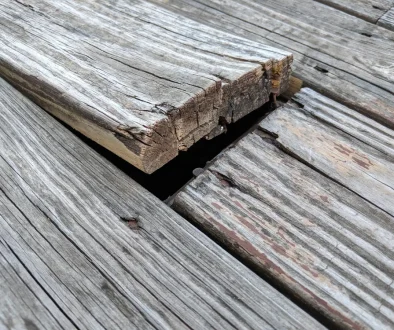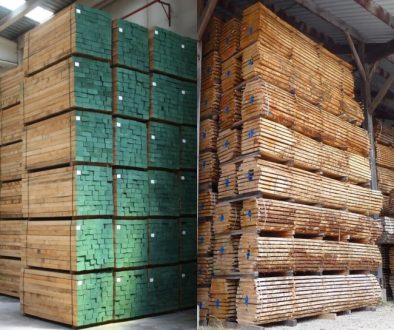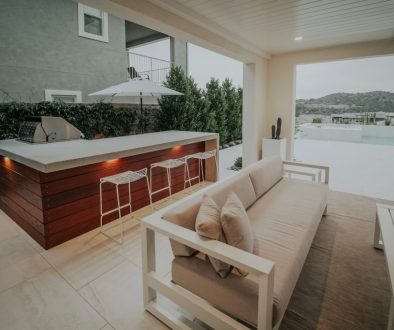Top Heat-Resistant Decking Materials for Lasting Outdoor Comfort

Top Heat Resistant Decking Materials for Lasting Outdoor Comfort
When it comes to enjoying your outdoor space, few things can be as disheartening as stepping out onto your deck barefoot only to find it scorching hot from the sun’s rays. As we get closer to the warm months of the year, it would be unfortunate to build a beautiful new deck that you can’t properly enjoy because your feet are too busy getting burned from the sun…
So, the choice of decking material plays a significant role in determining how comfortable your deck will be under the sun. In this blog post, we’ll explore decking materials that stay cool even on the hottest days, with a focus on tropical hardwoods, like ipe and cumaru. Additionally, we’ll discuss the evolution of composite materials, highlighting how newer collections from TimberTech and other major brands are making strides in reducing heat retention while comparing them to tropical hardwoods.
Top Heat Resistant Decking Materials
Tropical Hardwoods: Ipe and Cumaru
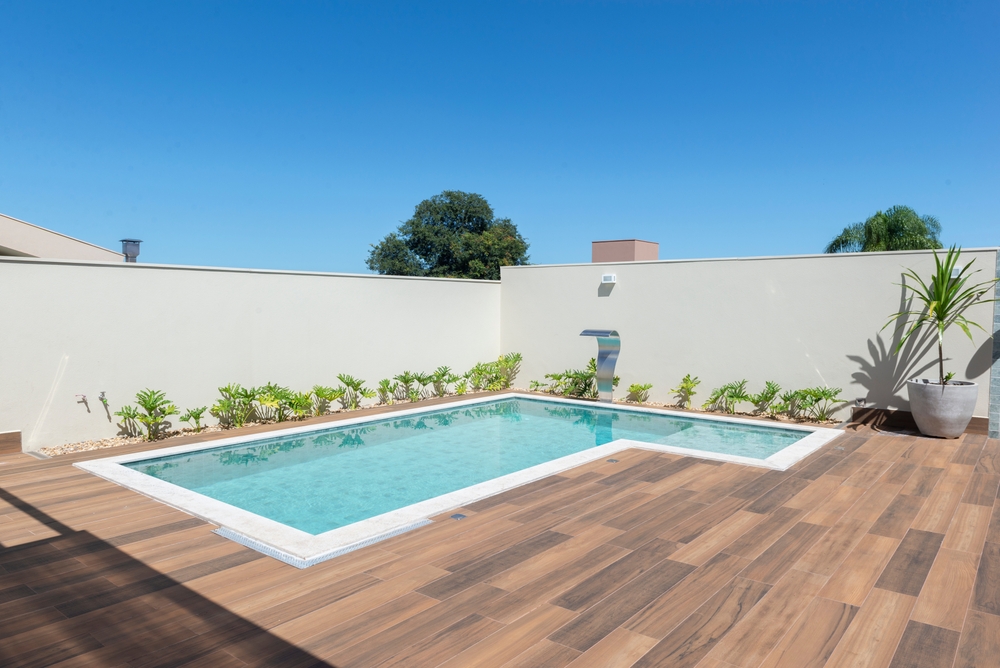
Tropical hardwoods have long been revered for their durability, beauty, and now, their ability to stay cool under the sun. Among these, ipe and cumaru stand out as prime examples. Their natural oils and extreme density make them resistant to heat absorption, ensuring that your deck remains comfortable even on scorching summer days.
These woods originate from South American forests, where the environment has played a key role in molding these woods to be resistant to fungus, decay, extreme weather, splintering, scratching, and mold—all threats no one wants to deal with when it comes to investing in outdoor decking.
Why Do Tropical Hardwoods Stay Cool?

Tropical hardwoods possess inherent qualities that contribute to their ability to stay cool. Their dense cellular structure and high oil content act as natural insulators, preventing excessive heat buildup. Unlike other materials, such as concrete or traditional composites, tropical hardwoods reflect much of the sun’s heat, keeping the surface temperature noticeably lower.
We’ve spoken to countless customers who’ve had standard composite decks in their backyards for ages, and get frustrated with how hot these decks can get when the sun hits them. For families with children running around, this can be especially dangerous and nerve-wracking.
On the other hand, our customers who’ve installed tropical hardwood, specifically ipe, decks in their backyards are ecstatic by the coolness of the wood, even on the hottest of days. Trust us, the first time we stepped on an ipe deck barefoot under the sun, we were shocked at how comfortable it felt.
Composite Materials: A History of Heat Retention
In the past and up until today, composite decking materials are notorious for retaining heat, often becoming unbearably hot to the touch. The composition of early composites, primarily consisting of plastic and wood fibers, contributed to their heat absorption properties. This issue continues to deter many homeowners from considering composite decking, especially in warmer climates where excessive heat can be a major concern.
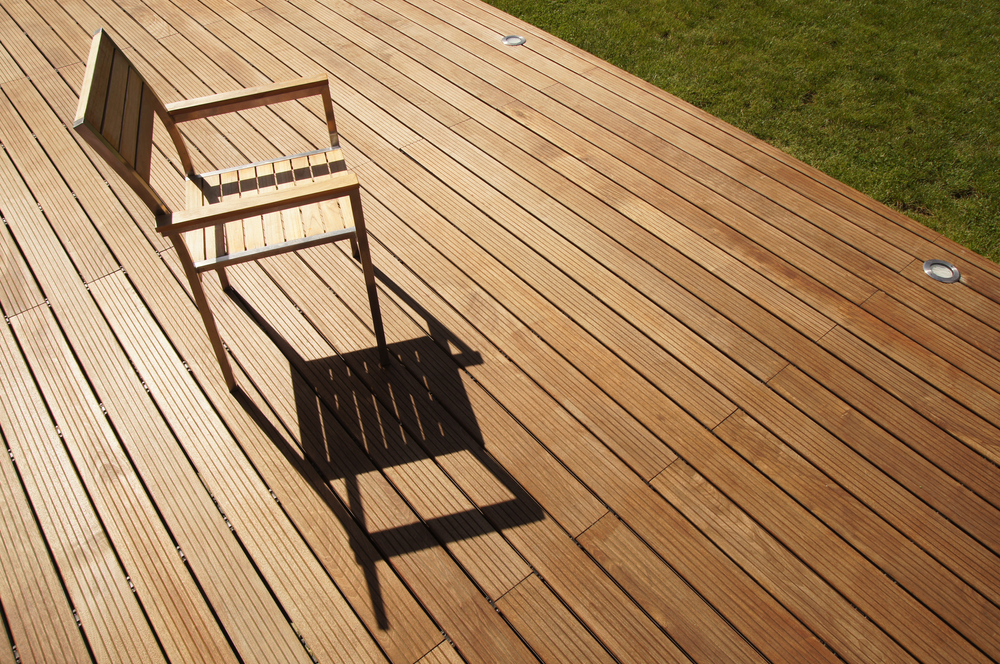
What Factors Contribute to Composite Deck Heat?
1. Darkness of the Wood: Dark-colored decking materials tend to absorb more heat from the sun compared to lighter-colored ones. This absorption can result in a warmer surface temperature, making the deck uncomfortable to walk on barefoot, especially in sunny climates like Los Angeles.
2. Air Temperature: The ambient air temperature also plays a significant role in determining how warm a deck becomes. In hot climates, where air temperatures can soar during the day, decks are more prone to absorbing and retaining heat, making them warmer to the touch.
3. Amount of Direct Sunlight: Decks that receive direct sunlight for prolonged periods tend to heat up more than those in shaded areas. The intensity and duration of sunlight exposure can significantly impact the temperature of the deck surface, especially during peak daylight hours.
TimberTech’s Innovation in Heat Reduction
Recognizing the need to address the heat retention problem, TimberTech has been at the forefront of innovation in composite decking. Their latest PVC deck boards incorporate advanced materials and design techniques aimed at reducing heat absorption and retention. TimberTech states that their boards stay up to 30° cooler in the sun!
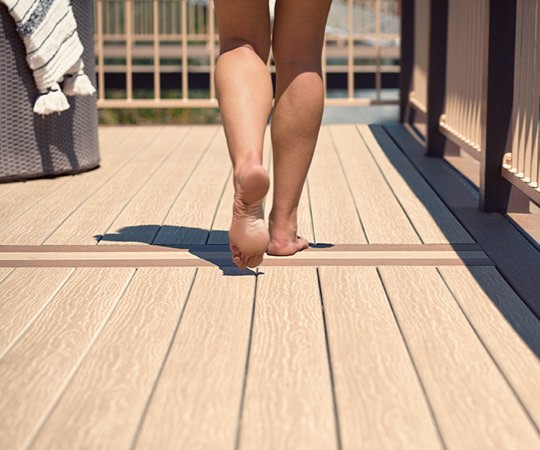
Comparing Tropical Hardwoods to Newer Composite Materials
While newer composite materials from TimberTech and other manufacturers have made significant advancements in mitigating heat retention, they still cannot match the natural cooling abilities of tropical hardwoods. Ipe and cumaru remain the top choice for homeowners seeking a decking material that stays comfortably cool, even on the hottest days.
Choosing the right decking material is essential for ensuring your outdoor space remains comfortable and enjoyable throughout the year. Tropical hardwoods like ipe and cumaru offer unmatched durability and natural cooling properties that make them ideal for hot climates.
While newer composite materials, including those from TimberTech, have made strides in reducing heat retention, they still have some way to go to rival the cooling capabilities of tropical hardwoods. Ultimately, when it comes to decking materials that stay cool in the sun, nothing beats the timeless appeal and practicality of tropical hardwoods.



